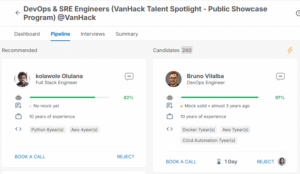On March 26th, 2020, VanHack Senior Canadian Immigration Consultants Karan Dhani and Melissa Arrambide hosted a live webinar where they provided an update on the situation and answered many of your questions.
The replay of the webinar is posted at the bottom of this post, but please note that some of that information may be out of date by the time you view it.
We urge you to check our frequently updated document that will have the very latest information. You can find that here:
How COVID-19 is affecting Canadian Immigration – Recent Updates
Questions asked on the webinar:
- Q1. What happens if someone is working on a Global Talent Stream work permit and they happen to get retrenched/laid off – will their spouse be allowed to continue working, or will they be affected as well?
A1. If the spouse already had applied for and received an Open Work Permit, they will not be affected in this situation. The Spousal Open Work Permit will remain valid and the spouse can keep working/get a new job as long as the work permit remains valid (typically 2 years).
Meanwhile, the primary application who got laid off cannot get another job on the same work permit (since that will be a closed work permit), but they are allowed to legally remain in Canada till the date listed on the work permit. They would need a new LMIA and new work permit if they wished to get a new job. - Q2. I was unable to fax my application and had to mail it via Canada Post. Will they process it?
A2. Yes, they are currently able to receive mail deliveries and will process them. You can also consider using an online fax service. - Q3. My candidate is holding a visitor visa in Canada. I would like to hire him via the Global Talent Stream. Does he need to be physically outside Canada once we get the approved LMIA and he applies for his work permit?
A3. Work permits submitted under the Global Talent Stream are usually processed in 14-days – but this time frame is ONLY for applications submitted from outside Canada. If the candidate is inside Canada, they can submit an application, but they will not get the benefit of the fast processing time. It’s impossible to predict what the processing time would be since there are so many changes, but it is technically possible to apply for a work permit from within Canada. - Q4. We just received an approval for an LMIA submitted before COVID-19, and would like to apply for the work permit. Is IRCC still processing these applications?
A4. Yes, applications are still being processed. In addition, when someone gets a work permit approved, they typically have one year to enter Canada. The actual work permit is issued when the worker enters Canada – the two year period starts from that date.
So, even if flights are currently suspended for a few weeks, your employee doesn’t need to worry for a while. A work permit approved on April 1, 2020 (for example), will give them till April 1, 2021 to arrive in Canada, and then have two years to word starting on the day they land. - Q5. I submitted my biometrics on March 5th (GTS application), but I haven’t heard from them since. Should I be worried?
A5. There is no cause for worry. We are seeing delays due to the rapidly changing situation. However, IRCC has confirmed that they will not delay applications for lack of documentation - Q6. Can I go to the border (flag-poling) to receive my new or renewed work permit?
A6. No, you cannot go to the border at this time as this is considered non-essential. For existing permits that need to be renewed, you should apply online before the permit expires to receive implied status that will allow you to keep working. - Q7. If I hire a remote worker (in their home country), how can I pay them? Do I need to wait for their work permit to be issued?
A7. No, you don’t have to wait. They can start working immediately since they have the right to work while in their home country. However, you should not pay them in a Canadian bank account (in case they happen to have one). You typically want to have them on a separate contract while they’re remote.
VanHack has a lot of experience with this scenario since we have many remote employees.
Our CEO Ilya is hosting a Live Webinar (April 7th, 2020) where he’ll go over all the questions around remote hiring. You can sign up for that webinar here – https://bit.ly/VH-RemoteHiring - Q8. Once workers are allowed to fly back to Canada, will they have to self-isolate? Or can they start working immediately?
A8. The current instructions require anyone flying back to Canada to self-isolate for 14 days.
And here’s the replay of the Canadian Immigration webinar
https://www.youtube.com/watch?v=AOxG8kc_dg8



